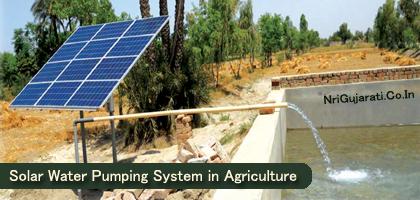Solar Water Pumping System in Agriculture - Advantages & Benefits
Solar water pumping system is very useful in agriculture. Solar is a powerful energy resource and vital source of energy in future. A solar water pumping system is one of the examples of the use of solar energy.
A solar water pump can run by solar energy through photovoltaic cell. This is the most efficient mode of generating electricity. This entire system can be used for agriculture. These solar water pumps can be used for small and large scale irrigation.
Solar energy is the conversion of sunlight into usable energy.
Solar Water Pumping System in Agriculture Advantage & Benefits:
Available in both type surface and submersible
Applicable for all type of bore, ponds etc
Maintenance free/Low DC/AC branded pumps fit and forget.
No any running cost, freedom from electricity bills.
Complete mounting structure (powder coated) with tracking system.
It can be installed in any remote areas
Properly designed AC drives to run AC pump with solar modules.
Simple installation
It is reliable
Economical and environment friendly
It does not require any monitoring as it is self starting
The system began pumping water (0.25 L/min) when the solar radiation intensity exceeded 300W/m2. Solar water pumping system operates on direct current. The output of solar power system varies throughout the day and with changes in weather conditions.
There are many companies in Gujarat who are making solar water pump system. The solar water pump system is available with various options based on your daily usage, water flow and more.
Currently many farmers are using diesel water pumps for irrigation which is having many disadvantages including fuel consumption, electricity charges, proper maintenance, not working without electricity, needs monitor for operation, making pollution, etc.
Electricity cut is the major problem in farming areas of Gujarat and India so the biggest advantage of solar water pumping system is that it does not need electricity. Solar water pumping system is good option for agriculture due to its various benefits and future scope. |
